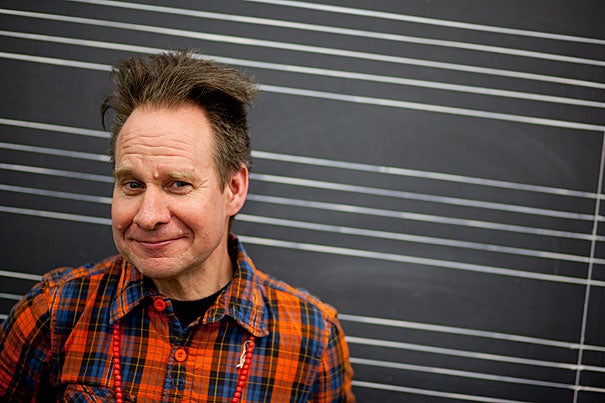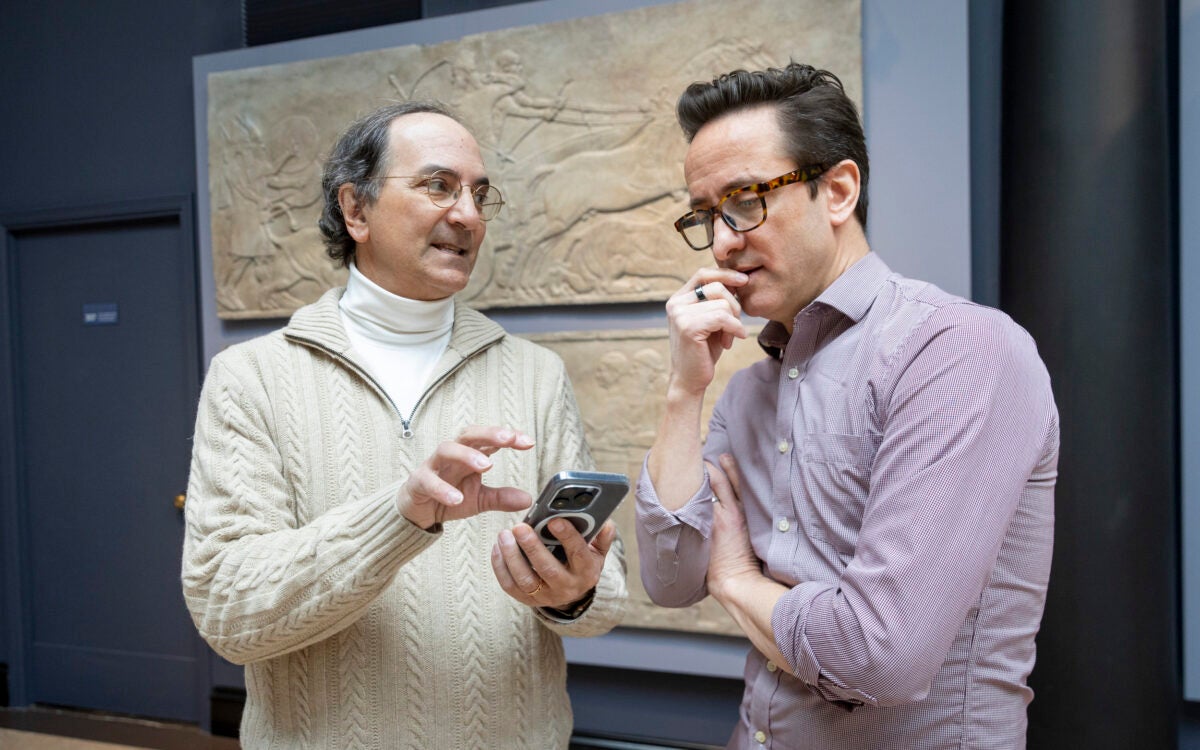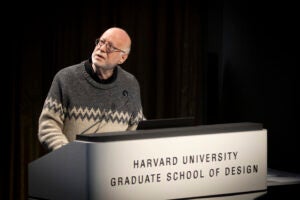
“My work does not yield itself to offering its meaning in a 10-minute span. I am offering something way more complicated, and it takes a long time to digest,” said Peter Sellars ’81, who spoke to Harvard students on April 5.
Rose Lincoln/Harvard Staff Photographer
A musical education
Students learn from, and perform, John Adams’ opera
Peter Sellars ’81 buzzed into a Harvard classroom. His hair standing famously at attention atop his head, the unconventional American theater director greeted students with bear hugs and engaged in a two-hour discussion on such topics as his take on critics, the historical and political themes in his work, and his creative process.
“My work does not yield itself to offering its meaning in a 10-minute span. I am offering something way more complicated, and it takes a long time to digest,” said Sellars, who once staged Mozart’s “The Marriage of Figaro” on a set resembling an apartment in New York City’s lavish Trump Tower.
He told the students during the April 5 discussion that he also loves “the presence of documentary inside a fiction form,” and recalled using declassified government documents to write the libretto for the John Adams opera “Doctor Atomic,” about the creation of the nuclear bomb. “You want surprises,” he said. “You want something to stick in people’s craw.” The teachers of Harvard’s new class “The Operas of John Adams” had invited Sellars to the session.
Planned to coincide with the Metropolitan Opera’s premiere of “Nixon in China,” the Adams opera, inspired by the landmark 1972 presidential visit to China, the course explores the works of America’s most well-known and most frequently performed living classical composer famous for enriching musical minimalism. (Adams ’69 will drop in on the class later this month.)
A recipient of the 2007 Harvard Arts Medal, Adams doesn’t shy from controversial themes. His works often examine historic events, as in “Doctor Atomic,” or his opera “The Death of Klinghoffer,” which recounts the 1985 murder of an American Jew by Palestinian terrorists.
Artists like Adams and Sellars “are shaping art right in front of us and making new work all the time, and it’s often very controversial work,” said Carol Oja, William Powell Mason Professor of Music. Oja co-teaches the class with Anne Shreffler, chair of Harvard’s Department of Music and the James Edward Ditson Professor of Music.
“Being able to get a sense of the inside process, of how they are shaping the balance of politics and their aesthetic is just really fascinating,” said Oja, who connected with Adams and Sellars with help from the Office for the Arts at Harvard.
Students in the Harvard Glee Club, the Radcliffe Choral Society, the Harvard-Radcliffe Collegium Musicum, and the Harvard-Radcliffe Orchestra are also studying Adams closely as they prepare to perform his “On The Transmigration of Souls” on April 29 and 30 in Sanders Theatre.
The work, commissioned by the New York Philharmonic Orchestra to commemorate those killed in the terrorist attacks of Sept. 11, 2001, won the 2003 Pulitzer Prize in music.
Andrew Clark, Harvard’s director of choral activities, chose the piece after hearing about the new course, in order to connect his program directly with the University’s music curriculum. Federico Cortese, director of the Harvard-Radcliffe Orchestra, suggested combining Adams’ piece with Beethoven’s Ninth Symphony for the concert. Juxtaposing Adams’ work, which leaves the listener in a “disquieted and vulnerable” place, with the “message of humanity and unity and joy” offered by Beethoven’s iconic symphony, was a “perfect pairing” said Clark.
Adams compiled the text for the piece from fragments taken from missing-persons signs posted in New York after 9/11, comments drawn mainly from interviews that appeared in the “Portraits of Grief” series in The New York Times, and a list of names of the victims.
The composer, who refers to the piece as “a memory space,” has said he hoped the work would inspire listeners with the feeling of walking into a cathedral where, “you feel you are in the presence of many souls, generations upon generations of them, and you sense their collected energy.”
“The general color is very soft,” said Cortese of Adams’ work, which requires a large orchestra. “It is a piece of private sorrow.”
The Sanders performances will be the Boston area’s premiere of the piece. Adams plans to attend. For more information about concert.




